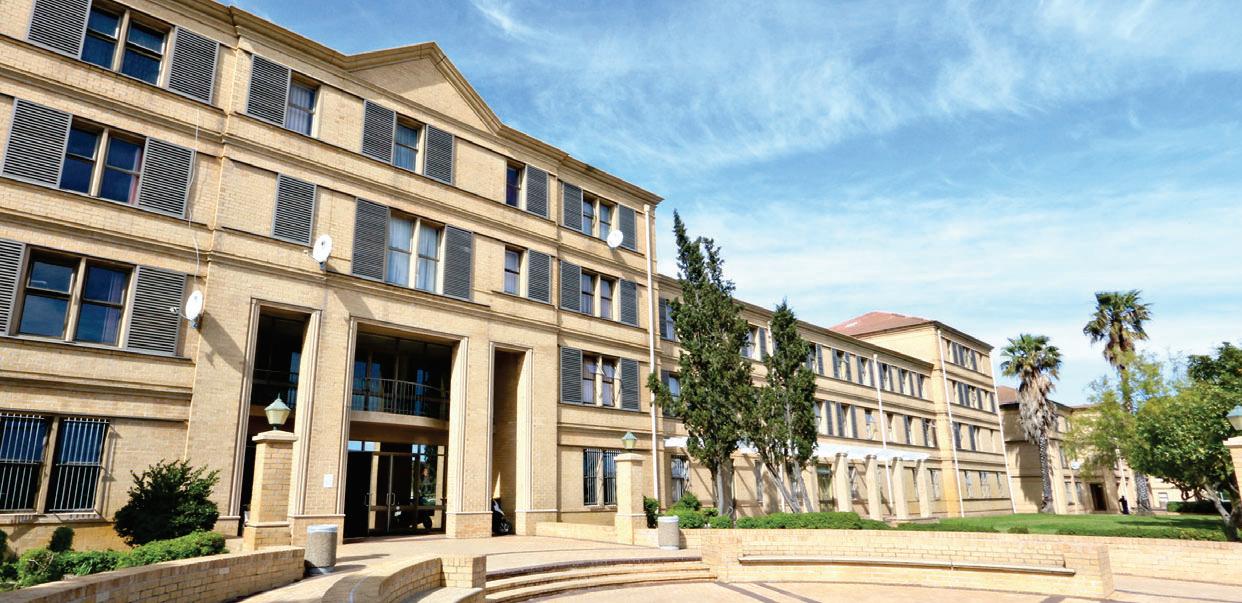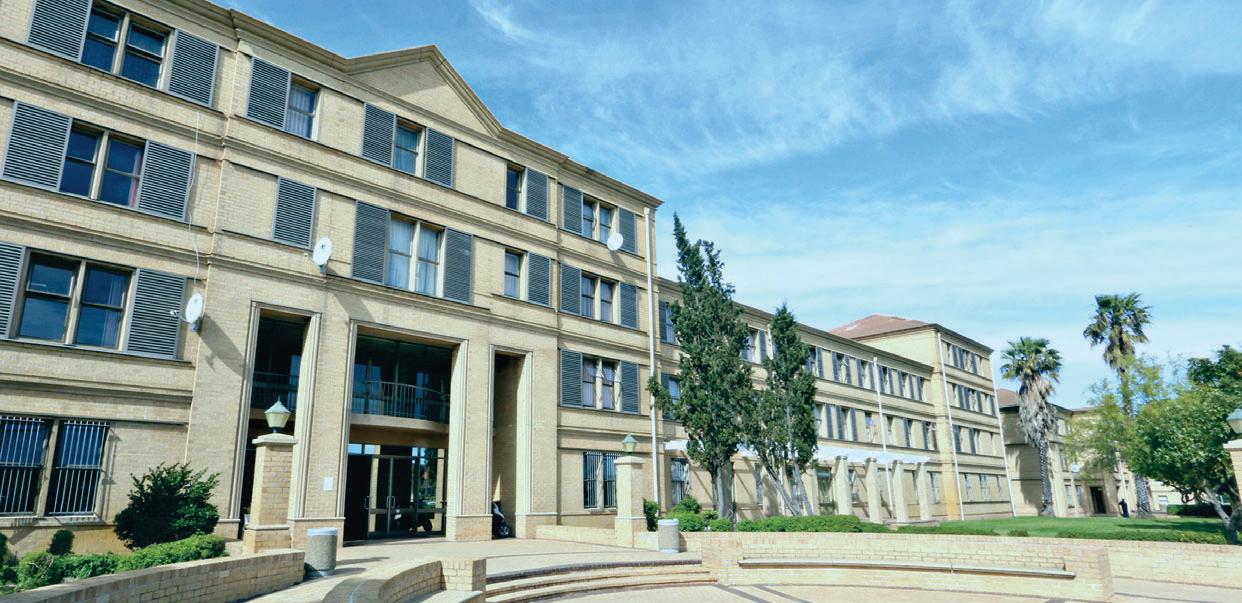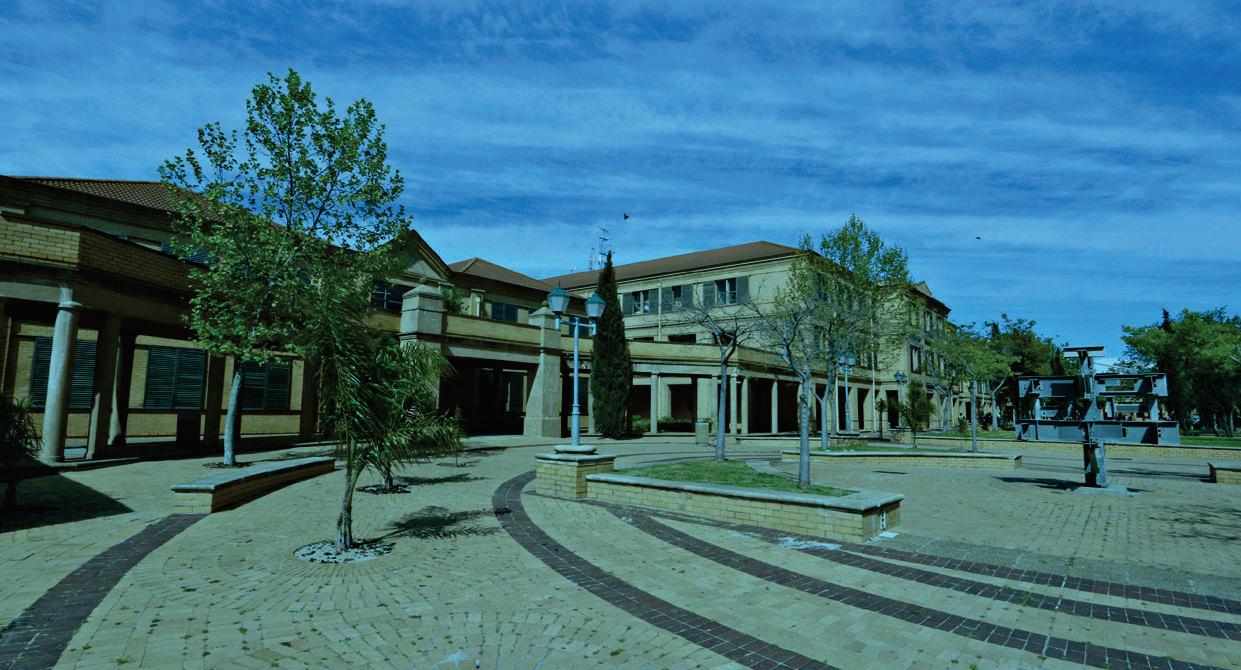ANNUAL INSTITUTIONAL REPORT ON GENDER-BASED VIOLENCE












6.3.
7.1.
10.1.













6.3.
7.1.
10.1.
In the light of President Cyril Ramaphosa’s acknowledgment that gender-based violence (GBV) is as much of a pandemic as COVID-19, it would make sense to report, reflect and evaluate the response of my university as it provides safe and inclusive spaces for our CPUT community.
This Annual Gender-Based Violence report is the first stand-alone consolidated GBV report, following the promulgation of the National Strategic Plan on Gender-Based Violence and Femicide (NSP-GBVF, 2020) that gave rise to the Policy Framework to Address Gender-Based Violence in the Post School Education in 202O/21. This policy compels our universities to not only create awareness of GBV but also to prevent it. I am also mindful of the fact that whether a student or a staff member escapes abuse at home or in the community, or overcomes trauma because of GBV, they often come to universities with the hope that they will be empowered in overcoming those challenges.
The Cape Peninsula University of Technology has institutionalised the elimination of GBV as one of the cross-cutting transformation signifiers of CPUT’s One Smart Vision 2030 Strategy. Our strategy is anchored on two dimensions of “Oneness” and “Smartness” within the institutional values of “Ubuntu”, “Ubunye” and “Ukungafani”.
We have declared a zero-tolerance approach to GBV that is also based on the localisation of the six pillars of the NSP-GBVF as it directly impacts on the CPUT community. The localisation of the six pillars of GBVF is also informed by the substantial evidence suggesting that education institutions that are using a participatory or engagement

Prof Chris Nhlapo VICE-CHANCELLOR
ANNUAL INSTITUTIONAL REPORT ON GENDER-BASED VIOLENCE
approach to GBV, as we are doing, lead to a positive and safe and violence-free learning, teaching and research environment.
It is within this context that the Institutional Gender-Based Committee (IGBVC) was formed to institutionalise the commitment of the university management and leadership to fight the scourge of GBV. I chair this IGVB Committee together with my Executive team to enhance GBV leadership and accountability. It ensures accurate reporting and reliable data management through various champions of the pillars, which include staff (academic and support), students, SRC, psychologists, social workers, labour, Campus Protection Services, Legal Services, Human Capital, Faculties, Research, and the ICT unit that are spread across the six-pillar coordination. This localisation of GBV pillars helps us to deepen participation, engagement, and social accountability across the university.
We acknowledge our external partners, amongst others: the Western Cape Sexual Offences and Community Affairs Unit of the NPA, and SAPS (Family Violence, Children Protection and Sexual Offences Unit).
This report details initiatives and strategies that have been engaged by the CPUT community, together with our external partners, in the fight against GBV and in living up to our value statement of zero tolerance of this scourge.
We have declared a zero-tolerance approach to GBV that is also based on the localisation of the six pillars of the NSPGBVF as it directly impacts on the CPUT community. The localisation of the six pillars of GBVF is also informed by the substantial evidence suggesting that education institutions that are using a participatory or engagement approach to GBV, as we are doing, lead to a positive and safe and violencefree learning, teaching and research environment.


This annual report is based on the implementation of the Policy Framework to address Gender–Based Violence (GBV) at the Cape Peninsula University of Technology (CPUT). The Policy Framework to address Gender-Based Violence in the Post-School Education and Training System is the Department of Higher Education and Training’s (DHET) response to the multi-sectoral, policy and programming framework provided by the National Strategic Plan on Gender-Based Violence and Femicide (DHET, 2020).

The United Nations Entity for Gender Equality and the Empowerment of Women, known as UN Women, defines violence against women as ‘any act of gender-based violence that results in, or is likely to result in, physical, sexual, or mental harm or suffering to women, including threats of such acts, coercion or arbitrary deprivation of liberty, whether occurring in public or in private life.’ GBV is an expression of unfair discrimination against women flowing from patriarchy and gender inequitable attitudes. Men’s use of violence against women (and men) is linked to learnt toxic masculinity flowing from harmful gender norms taught and promoted through society, culture and religion (UN Women, 2015).
CPUT continues to show its commitment to zero-tolerance on all forms of GBV. The commitment was further displayed by Management taking the lead in receiving training on GBV before the training was rolled out across the university. The GBV reports are coordinated through:
The Institutional Transformation Forum (ITF) that coordinates quarterly GBV reports from faculties, divisions, departments, units and centres; and The Institutional Gender-Based Violence Committee (IGBVC) that coordinates GBV reports in line with the six GBV Pillars of the GBV Policy.
GBV is an expression of unfair discrimination against women flowing from patriarchy and gender inequitable attitudes. Men’s use of violence against women (and men) is linked to learnt toxic masculinity flowing from harmful gender norms taught and promoted through society, culture and religion (UN Women, 2015)
The following key strategic partnerships support the implementation of GBV across the university:
2.1 CPUT’s partnership with the Sexual Offences Community Affairs of the National Prosecuting Authority (NPA)
CPUT has established a partnership with the Sexual Offices Community Affairs (SOCA), a division of the Special Director of Public Prosecutions of the NPA. The SOCA division is responsible for eradicating all forms of gender-based violence, facilitating and formulating research techniques for prosecuting sexual offences, domestic violence, developing and implementing training, capacity building and community awareness programmes on GBV.
The key area of collaboration with CPUT include: rolling out of GBV Training across the university; developing the GBV Reporting Procedures; and developing a Sexual and Gender-Based Violence (SGBV) policy by integrating the Sexual Harassment and the Gender-based violence policies.
2.2. CPUT’s linkages with Thuthuzela Care Centres
Thuthuzela Care Centres (TCCs) are one-stop facilities that have been introduced as a critical part of South Africa’s anti-rape strategy that is aimed at reducing secondary victimisation to ensure successful prosecution.
Services offered at the TCCs that CPUT enjoys: welcome and comfort from a site coordinator or nurse; an explanation of how the medical examination will be conducted and what clothing might be taken for evidence; a consent form to sign that allows the doctor to conduct the medical examination; a nurse in the examination room; after the medical examination, there are baths or shower facilities for survivor use; an investigation officer will interview the survivor and take his/her statement; a social worker or nurse will offer counselling; a nurse arranges for follow-up visits, treatment and medication for sexually transmitted infections (STIs), HIV, and AIDS; a referral letter or appointment will be made for longterm counselling; the survivor is offered transportation home by an ambulance or the investigating officer; arrangements for the survivor to go to a place of safety, if necessary; consultation with a specialist prosecutor before the case goes to court; court preparation by a survivor assistant officer; and an explanation of the outcome and update of the trial process by a case manager.
This means that all CPUT GBV survivors have direct access to any Thuthuzela Care Centre in the Western Cape.
ANNUAL INSTITUTIONAL REPORT ON GENDER-BASED VIOLENCE
THUTHUZELA CENTRES THAT PROVIDE SERVICES TO CPUT IN THE WESTERN CAPE
PROVINCIAL MANAGERS THUTHUZELA CENTRE (TTC) HOSPITAL SITE
Adv Mark Kenny Cell: 0842514417 mkenny@npa.gov.za
Adv Lizelle Africa Cell: 0842612641 iafrica@npa.gov.za
Adv Garry Titus Cell: 0724566746 gtitus@npa.gov.za
GEORGE TCC
George Provincial Hospital, Davidson Road, Glen Barrie, George
KARL BREMER TCC
Karl Bremer Hospital, Corner Mike Pienaar Boulevard & Frans Conradie Avenue, Belville
KHAYELITSHA TCC
Khayelitsha Hospital
Khayelitsha Community Health Centre
Lwandle Road, Site B, Khayelitsha
MANNENBURG TCC
GF Jooste Hospital, Duinefontein Road, Mannenburg
WORCESTER TCC
Worcester Hospital, Murray Street, Worcester
WESFLEUR TCC
Wesfleur Hospital, Wesfleur Circle, Atlantis
CONTACT DETAILS
Tel: 044 873 4858
Fax: 044 873 6748
Email: vezasiea@yahoo. com
Tel: 021 948 0861
Fax: 021 918 1341
CASE MANAGERS
SITE COORDINATOR/ SURVIVOR ASSISTANCE OFFICER (VAO)
Gerda MarxMs Angelique Vezasie
Ms Waldette Packery Ms Nobuhle Malunga (SC)
Tel: 021 360 4570
Email: boni.mogale@gmail. com
Ms Audrey Ziervogel Ms Boniswa Mogale (SC)
Tel: 021 699 0474Mr Deon RuitersMs Mandisa Ngonongono (SC)
Tel: 023 348 1294
Fax: 023 342 265
Email: worcestertcc@gmail. com
Tel: 021 571 8043
Fax: 021 572 4420
Email: tccatlantis@gmail. com
Ms Cindy AbdolMs. Cindy Williams (VAO)
n/aMs Avril Losper (SC)
2.3 CPUT’s Partnership with the Family Violence, Child Protection and Sexual Offences unit of the South African Police Services
The main mandate of the Family Violence, Child Protection and Sexual Offences (FCS) unit of the South African Police Services (SAPS) is to ensure survivors of the heinous crimes of rape, murder and child pornography are treated with the utmost care to avoid secondary victimisation. This includes ensuring the effective prevention and investigation of GBVrelated crimes and excellence in service delivery to survivors
of GBV, family violence, crimes against children and sexual offences, and to increase the detection rate of domestic violence crimes.
The key areas of collaboration with CPUT include: referral system for CPUT on GBV cases; provision of psycho-social support to survivors of GBV; ensuring arrest and conviction of perpetrators of rape and GBV; and ensuring effective prevention and investigation of GBVrelated cases between students and external partners (e.g., student and outsiders).
2.4 SAPS FCS units supporting CPUT in Western Cape
MOWBRAY Claremont FCS Warrant Officer Sonday082522107202165719750825221078
ATHLONE Nyanga FCS
2.5 Other key stakeholders that provide GBV intervention programmes to students
The following are key partners that assist students on GBV-related matters (the list is not exhaustive):
Higher Health, UN Women, Department of Social Development, Department of Health, Commission for Gender Equality (CGE), Sonke Gender Justice, Networking HIV & AIDS Community of Southern Africa (NACOSA), Soul City, Rape Crisis, Ilitha Labantu, Snake Nation, and PlanetUni Church.
This means that all CPUT GBV survivors have direct access to any SAPS (FCS) in the Western Cape, as indicated above.
SPECIFIC FOCUS
The Accountability, Coordination and Leadership Pillar (Pillar 1) sets out to ensure accountability at the highest level of governance across the university through individual and collective leadership by establishing an institutional architecture that would ensure a well-coordinated multisectoral response to GBV. The key priorities for this pillar include setting up an Institutional Gender-Based Violence Committee (IGBVC), which would serve as the custodian for the institutionalisation of GBV across the university.
GBV Pillar 1 has key outcomes which include: bold leadership and strengthened accountability across the university strategically with clear messaging and adequate technical and financial resources; strengthened multisectoral coordination and collaboration across the university; integration of GBV across the seven Focus Areas of One Smart Vision 2030 Strategy; and accountability by submitting reports to Management and the Council of the university.
Pillar 1 remains a key priority, given that institutionalisation is an iterative process of building, reinforcing and bolstering an architecture that is responsive to the GBV pandemic at CPUT. Key highlights include the following:
3.2.1. Institutional Gender-Based Violence Committee
The Institutional Committee on Gender-Based Violence (IGBVC) was established in 2022. It localises the six pillars of the National Strategic Plan on Gender-Based Violence (NSPGBV) to enhance GBV responsiveness at CPUT.
The establishment of the IGBVC is an indication of the commitment of leadership and management in eradicating GBV on campus.
The IGBVC is chaired by the Vice-Chancellor, Prof Chris Nhlapo
3.2.2. The GBV accountability at CPUT
INSTITUTIONAL REPORT ON GENDER-BASED VIOLENCE
Chairperson of IGBVC: Prof Chris Nhlapo, Vice-Chancellor and Principal Secretariat: Ms Valmarie Cornelius
GBV PILLARSGBV EXECUTIVE LEADERSGBV TECHNICAL LEADERS
PILLAR 1: Accountability, Coordination and Leadership
PILLAR 2: Prevention and Rebuilding Social Cohesion
PILLAR 3: Justice, Safety and Protection
PILLAR 4: Response, Care, Support and Healing
PILLAR 5: Economic Empowerment
PILLAR 6: Research and Information Management
Mr Sello Mokoena (Registrar)
Prof Driekie Hay-Swemmer: (ED: OVC)
Prof Gilingwe Mayende (DVC: Operations)
Prof Gilingwe Mayende (DVC: Operations)
Mr Peter du Plessis (ED: Finance)
Dr David Phaho (DVC: RTIP)
Prof Rishi Balkaran (DVC: Teaching and Learning
3.2.3 Coordination of Pillar 1
Prof Paul Green (Chairperson of ITF & Dean FBMS)
Ms Nonkosi Tyolwana (Director: OVC)
Ms Carin Booyse (Deputy Registrar: GLS)
Mr Sikhumbuzo Vilakazi (Director: CPS)
Mr Joseph Makgoba (Manager: Employee Relations)
Mr Tulani Nkuntse (Acting Dean of Students)
Ms Ncediwe Qomoyi (Director: Human Capital)
Mr Mandla Maseko (Director: Advancement)
Dr Xena Cupido (Director: Fundani)
Prof Judy Peter (Director: SIP)
The Core Team under the leadership of the Registrar is responsible for the compilation of a report for updates on the progress of Pillar 1.
The key tasks of the Core Team include the following:
Addressing misgendering with regards to registration or admission forms and ensuring that CPUT policies are compliant with inclusivity to ensure that no stereotyping exists in the institution’s policies; Ensuring that the Council is workshopped on GBV as one could not assume that Council was familiar with GBV matters; Establishing a process which ensures that Council nominees have been screened for sexual offenses before they were appointed as Council members, by making use of the revised National Register for Sexual Offenders Amendment Act, as approved by Parliament;
The Task Team could co-opt the Directorate Research Development to assist with the above interventions.
ANNUAL INSTITUTIONAL REPORT ON GENDER-BASED VIOLENCE
SPECIFIC FOCUS
Pillar 2 sets out to turn the tide of GBV by focusing on eliminating the social acceptance of all forms of violence against women and lesbian, gay, bisexual, transgender, intersex, queer, asexual and other sexually or gender diverse (LGBTQIA+) persons through the development and implementation of long-term, comprehensive, adaptable, context-specific and holistic approaches to prevention. The focus is on transforming harmful social and structural norms that feed GBV while intentionally reshaping the values and norms in ways that build positive social cohesion and restore human dignity.
Safe zones across the university University spaces are made safe & violence-free for all, particularly for women, LGBTQIA+ and persons with disabilities
Restoration and healing
Strengthened programming that addresses the restoration of human dignity, builds caring communities & responds to historic and collective trauma
Dismantling toxic masculinity
Shifts away from toxic masculinities towards embracing positive alternative approaches for expressing masculinities and other sexual and gender identities
Homophobic GBV
Optimally harnessed violence against women and LGBTQIA community programmes that have an impact on GBV eradication
Evidence-based GBV- prevention programmes
Strengthened delivery capacity to roll out evidence-based prevention programmes
Behavioural change
Changed behaviour & social norms within key groups because of the rollout of evidence-based prevention interventions
Cross fertilisation and integration of GBV programmes
Increased cross fertilisation & integration of preventive interventions on violence against LGBTQIA+ persons with disabilities and broader Gender-Based Violence and Femicide (GBVF) prevention & violence prevention interventions
4.3.1. Establishment of Task Team on GBV Policy plans
A Task Team on the Sexual and Gender-based violence (SGBV) Policy was established to review and integrate the Sexual Harassment Policy with the GBV policy. This task team comprised representatives from Transformation, Human Capital, Student Affairs, Campus Security, Legal Services, and included a partnership with the NPA.
4.3.2. GBV and young women student empowerment
Women students in higher education, among other challenges, are faced with numerous challenges that limit career achievements and progression. EmpowHerSA-CPUT was launched in partnership with the EmpowHerNg Co-conveners (Nigeria) in August 2022. CPUT is the first university in South Africa to sign as part of EmpowHer International – a mentoring programme that is aimed at empowering undergraduate young women until they obtain their qualifications.
It targets women students from first year to the final year and aims to assess the Gender Parity Index (GPI) from enrolment to graduation to enhance access and success. The GPI is also critical to gauge the success of women students in previously male-dominated fields such as science, technology, engineering, arts, mathematics and innovation (STEAMI).
The first cohort of students across faculties signed up for EmpowHer in August 2022 and the induction programme took place on 25 November 2022.
4.3.3. GBV and men as partners in eradicating GBV
This initiative was enacted in the context that gender is not a women’s issue, it is everybody’s issue and a human rights issue. The roles of women, men and the gender nonconforming community are critical in promoting gender equality and women empowerment. CPUT, in partnership with UN Women South Africa Multi-Country Office, launched the HeForShe programme where the Vice-Chancellor, Prof Chris Nhlapo signed the HeForShe pledge in 2018. Following that, the CPUTMen Pledge was developed and shared across the university. CPUT was the second university to sign up for HeforShe after Wits University.
Research shows that men are the principal perpetrators of violence against women and girls, and a radical mindset shift is necessary to bring about lasting behavioural change. However, it is essential to note that marginalizing men to empower women only worsens GBV.
The HeForShe Student Ambassadors programme was established as an initiative to engage men as students and staff in the fight against GBV. It involved:
Embedding gender equality in university policies through programmes like mandatory bias training and malefocused gender curricula to educate and empower men as gender equality advocates;
Creating thousands of HeForShe male champions within each campus;
Increasing the percentage of women in senior leadership positions through mentoring opportunities; and Reaching complete gender parity in undergraduate intake programs to build the pipeline of future female leaders.
In May 2022, the first cohort of the HeforShe Ambassador programme was launched to enhance the involvement of men (students and staff) in GBV, gender equality and women empowerment across the university.
4.3.3.1. CPUT Men’s Pledge
Below is a Men’s Pledge that is used by men as they commit to fighting GBV.

CPUT is the first university in South Africa to pilot the ThinkTank on Gender Equality and Women Empowerment (GEWE) in collaboration with the UN Women South Africa MultiCountry Office.
The Think-Tank was inaugurated in June 2022 and consists of representatives from faculties, the SRC, departments, divisions and centres. Its establishment also recognises the significance of gender mainstreaming as a critical strategy for accelerating Sustainable Development Goal five (SDG5) as the cross-cutting pillar of all SDGs. This includes the integration of feminism in the decolonisation agenda within African feminism.
The GEWE serves as an oversight body for the implementation of women empowerment and gender equality. It is aligned with the SDG 5 indicator on Gender Equality and Women Empowerment, the cross-cutting SDG across all 17 DSG Goals.
4.3.5
Various quarterly reports on GBV activities from faculties, divisions, departments, centres and structures were submitted to the Institutional Transformation Forum (ITF). Key GBV-related transformation activities undertaken by these components were as follows:
(a) Faculty of Education:
• On 5 August 2022, the Faculty held a Women’s Day symposium under the theme: GBV “Creating safe spaces: Gender identity and sensitivity in language use”.
(b) Faculty of Business and Management Sciences (FBMS):
• GBV is now a mandatory model in the FBMS curriculum of the Faculty.
• The FBMS partnered with IAM Non-governmental organizations (IAM NGO) in conversations on Sexual and Gender Diversity themed “Unheard Voices of the LGBTIQ+ Youth” which provided a platform for youth to engage in discussions about sexual and gender diversity which was attended by 936 students across the faculty.
• on 11 August 2022, the Faculty invited Dr Nyx McLean, an National Research Foundation (NRF) -rated researcher and Research Associate at Rhodes
University who engaged over 180 students and staff members in an interactive honest conversation which was mainly question-driven. The theme of the conversation was “Creating safe spaces: Respecting gender identities and pronouns”.
(c) Faculty of Applied Sciences
• In the Faculty of Applied Sciences, Prof Opeolu presented a paper on GBV and Climate Change at the virtual international conference on Gender and Climate in April 2022.
• The Faculty partnered with the Office of the ViceChancellor, Research Technology Innovation and Partnerships (RTIP), and the Division of Student Affairs to honour women students and launched EmpowHerSA CPUT on 30 August 2022.
(d) The Faculty of Informatics and Design (FID)
In FID, Prof Ngqondi presented on “Women’s dignity and digital inclusion” at the CPUT’s International Women’s Day celebration.
• GBV is integrated in orientation and awareness raising across the Faculty.
• The Faculty also held a Women’s Day luncheon on 31 August 2022 where several key issues were unpacked. The empowerment of women in learning and workspaces and the creation of safe spaces for women in the workplaces were some of the topics.
(e) The Faculty of Engineering and The Built Environment (FEBE)
• The Faculty undertook several campaigns i.e., sanitary and food drives, amongst others. This programme had been running for the past four years. Various seminars were conducted in August 2022 which included topics on mental health, GBV, sexuality and women empowerment.
• In the FEBE, GBV is high in the research agenda and a number of GBV webinars were conducted.
(f) Faculty of Health and Wellness Sciences
• GBV, diversity and inclusivity topics were incorporated into the curriculum of 1st, 2nd, 3rd and 4th year programmes. The faculty was also actively involved in sanitary drives and food security initiatives for students.
(g) The Marketing and Communication Department (MCD)
• MCD established a CPUT style guide making provision for gender pronouns which fostered an inclusive environment and affirmed a person’s gender identity through a uniform guide for writing university documents.
(h) The Service Learning and Community Engagement Unit
• The unit provided students with authentic GBV learning experiences through community-based projects and programmes.
(i) The Office of the Vice-Chancellor hosted the following activities:
• A Men’s Dialogue on GBV and Masculinity was held on 1 August 2022 in partnership with RTIP, Fundani, and Takuwani Riime.
• A successful gender mainstreaming webinar in partnership with RTIP and the Gender Institute was held on 28 August 2022.
• A women empowerment and annual award ceremony was held on 30 August 2022. This was an annual award ceremony aimed at encouraging women students to excel in academic and residence life through various mentoring and coaching programmes.
• On 30 August 2022, CPUT launched an international mentorship scheme called EmpowHer. The programme targeted female undergraduate students across faculties. The seminar was held in collaboration with Research, Technology Innovation and Partnerships (RTIP), Applied Sciences, Faculty of Informatics and Design (FID), Division of Student Affairs (DSA) and focussed on providing academic and pastoral support to undergraduates by pairing them with postgraduate female students who can leverage the benefits of their experience to mentor them. More than 200 students attended the event and 28 undergraduates and graduates received CPUT Young Female Student Awards.
CPUT was the first university in South Africa to join the mentoring programme of EmpowHer International.
(j) The Student Representative Council
The student leadership has undertaken several GBV initiatives in collaboration with DSA to enhance a studentled GBV approach.
• In collaboration with Student Affairs and Snake Nation a very successful dialogue was hosted on “Alcohol and drug abuse as drivers of GBV”.
• The event was held at the Student Centre on 28 July 2020. More than 200 students participated and a follow-up series is being planned.
• The Queer Unicorn Society of the SRC provides a crucial service in fostering self-worth, self-belief and resilience in LGBTQA+ students at a critical juncture in their lives. This includes GBV awareness-raising on the LGBTQIA+ community.
• The District Six SRC is involved in a drive for sanitary dignity ware to raise awareness on reproductive rights.
(k) Division of Student Affairs
• A combined Student Affairs Substance, mental health and GBV awareness project was hosted in July 2022, in partnership with the Department of Social Development and the National Institute Community Development and Management.
• This campaign included virtual and campus activities, focusing on creating awareness of the impact of substance abuse, and advocating for healthy living. Most GBV cases stem from alcohol or substance abuse.
• GBV awareness-raising initiatives such as “No to substance abuse”, “Mental health” and arts and culture as a tool for raising GBV awareness.
• On Bellville campus, an exhibition on healthy living with health screening and resources on substance, GBV, wellness and mental health was held on 19 July 2022. The same exhibition was held on District Six campus on 20 July 2022
• A play was performed on substance and GBV on 17 and 18 August 2022 on Bellville and District Six campuses respectively.
• A creatives challenge took place, partnering with Snake Nation. Students were challenged to use digital media and visual arts to illustrate the effects of substance abuse.
• Printed posters were distributed on campus focusing on substance use and abuse, together with Department Social Development GBV Command Centre information.
• A round table discussion titled “Inclusivity at Higher Education sectors for LGBTIQA+ students and staff” was arranged by the Student Governance and was well received by students and staff. Student Governance intends to take this process further.
ANNUAL INSTITUTIONAL REPORT ON GENDER-BASED VIOLENCE
Pillar 3 sets out to address the systemic challenges that have resulted in an inadequate response to the management of GBV cases, particularly domestic violence, sexual offences, child homicide, human trafficking, and other related matters.
It aims to facilitate access to justice, safety and protection in response to the needs of survivors of GBV using domestic legislation, policies, national and regional protocols, and to address the infrastructural and resourcing challenges that have obstructed the optimal delivery of justice to different survivors.
This Pillar identified key outcomes to be realised from the date of implementation of the strategy:
Improve access to survivor support services through a survivor-centric criminal justice service that is sensitive to and meets their needs.
Strengthen capacity within the Campus Protection Services (CPS) to address impunity and facilitate justice for the GBV survivors.
5.2.1 Case register and statistics
CPUT is unfortunately a microcosm of what is happening in the broader society. A total number of eight GBV cases were reported from 4 August 2022 to December 2022.
THESE INCLUDED:
5.2.2 Rape cases
• Three rape cases were reported, and all three opted to open cases at the South African Police Services (SAPS).
• The survivors all received counselling from the Student Counselling department.
5.2.3 Sexual harassment cases
• One sexual harassment case was reported on 11 August 2022.
• A case was opened at SAPS.
5.2.4 Harassment cases
• Three cases of harassment were reported and the survivors received counselling.
• One of these cases was harassment through cyberbullying (domestic violence).
5.2.5 Sexual assault
• A case of sexual assault was reported on 12 September 2022.
5.2.6 Recommendations from the Committee
The IGBVC expressed concern about the high number of GBV related cases at the University and further noted that:
• Cyberbullying was a form of domestic violence and survivors normally did not come to the fore to report such cases.
• The University should increase its investigative capacity as the lack of human resources resulted in delays.
• The University only had a few counsellors who could deal with GBV cases.
• GBV cases occurred at both CPUT owned and privately owned residences.
• Adequate security services should be always available at residences.
• The safety and protection of students and staff should be the University’s top priority.
5.2.7 Statistical reporting on the GBV occurrences for staff
A total number of eight cases were reported from 2021 to 2022.
There were, however, two arbitration hearings that were scheduled at the Commission for Conciliation, Mediation and Arbitration (CCMA) based on staff who were dismissed on sexual harassment-based cases.
Two of these cases were withdrawn and five of the six survivors chose not to open a case at SAPS. Only one survivor opened a case with SAPS.
Three rape-related cases were reported in quarter one of 2022 of which one of the survivors withdrew the case at the final stage of the disciplinary process. The survivor also refused assistance from Student Counselling. The other two cases were still under investigation.
In the fourth quarter no new cases of sexual harassment or gender-based violence were reported.
5.2.8 Key issues related to GBV reporting and occurrences
Key issues include the following:
The reluctance of survivors to report and pursue these cases was a huge concern. Not pursuing these cases would give perpetrators the notion that they could get away with GBV.
Awareness campaigns and training to persuade survivors to come forward and pursue their cases are critical.
Survivors needed to be assured of CPUT authorities’ protection and that their cases would be handled with absolute confidentiality and sensitivity.
5.2.9 Recommendations by the IGBV Committee:
GBV processes should be thoroughly explained to staff and students to build trust and to assist with addressing reluctance in pursuing such cases. Assigning of an individual specialist in GBV to engage with survivors so that the survivor does not have to explain the incident to too many people, as this could be discouraging.
Unpacking and researching the root causes of hesitancy, studying the trends, patterns and reasons. Establishing key interventions involving male students to bring about behavioural changes and crucial conversations on masculinity and manhood in eradicating GBV.
Establishing an anonymous 24-hour digital emergency system dedicated to reporting incidents and dealing with GBV cases. Dealing with it anonymously could create some comfort for survivors.
Posters emphasising the reporting of GBV, related processes, and a zero-tolerance attitude could be helpful. This should be posted in classrooms, residences and notice boards across campuses. Self-defence classes for women and the vulnerable were also recommended.
This pillar sets out to ensure that every survivor of gender-based violence has access to appropriate and sensitive response, care and support that facilitates immediate containment, medium to long term healing, and agency towards reclaiming their bodies, mental and physical health, well-being, and lives.
All survivors should be able to access care and support services to reduce the impact of GBV 24 hours a day and seven days a week. A survivor-centred approach to the provision of services, underpinned by feminist principles, must be applied in the provision of:
• Survivor Empowerment Centre – a holistic, comprehensive, consistent, confidential, equal and equitable quality service responsive to the diverse needs of women across ages, sexual and gender diversities, including the need to provide support to their children;
• A standardised core package of services by trained, skilled, compassionate and competent staff which includes access to health and mental care, appropriate after-care services and referrals/feedback systems;
• The active engagement of communities, including women, children and LGBTQIA+ (Lesbian, Gay, Bisexual, Transgender, Queer, Intersex, Asexual and other extension) persons to end GBV and to promote survivors’ access to services.
The overall focus of Pillar 4 is threefold: Strengthening and overhauling services and systems; improving relationships between stakeholders; building and bolstering resilience through harnessing the capacity of institutions, households, and communities to play important roles in responding to and supporting survivors.
During the period under review, the following progress can be reported: Student Counselling has five core programmes that target the holistic treatment, prevention and development of students’ wellbeing, adjustment, and mental health. The core service of Individual Counselling and Therapy saw 85 new clients with 125 sessions facilitated for the period 22 October to 23 December 2022.
The brief analysis of the counselling statistics shows that 49% of those attending counselling identified as female, and 49% of students who made use of the service were based in residence. The main reasons students sought counselling support during this period were food security and accommodation challenges (25%), academic problems (25%), anxiety (15%) and depression (13%).
The Division of Student Affairs (DSA) facilitated five workshops on GBV with the focus on psychoeducation to 320 students from different academic departments.
The DSA facilitated various campus activities which included an arts and creative competition and substance abuse awareness talks.
All departments and units within DSA were involved in GBV response, care, support and healing with Student Counselling and the HIV/Aids Unit taking the lead.
The Department of Student Counselling provided support and treatment to 43 clients who reported either childhood or recent incidents of GBV. 16 of these cases were recent incidents, of which nine occurred on CPUT campuses or property. Seven students were alleged to be the perpetrators.
Residence Peer Helpers were based in various CPUT residences and have been trained to identify and refer students who present with mental health challenges or who require support to Student Counselling. As such, they also act as a source of referral for any GBV cases identified in residence.
The DSA continues to encourage students to report incidences of GBV.
The Division of Student Affairs (DSA) should have a functional unit which deals with GBV cases. Such unit should embark on awareness campaigns where students are informed of the CPUT processes in the instance where they fall victims to GBV.
Sustainable prevention and an establishment of an emergency response plan is necessary.
As the University of the Western Cape (UWC) had social workers on their premises, CPUT could engage UWC to request assistance with social services.
It was imperative that the University establish the “Survivor Empowerment Centre” as recommended in the GBV Policy for Higher Education. This would be a one-stop centre that should provide service 24 hours a day and provide services such as trauma counselling and psychological support, healthcare, police services, legal assistance and shelter for survivors of abuse.
It was critical that counselling services be made available after hours as most of the gender-based violence cases occurred after hours when perpetrators were under the influence of alcohol.
A recommendation for after-hours counselling services would be submitted via the Office of the Deputy ViceChancellor: Operations to Mancom
The University had a code of conduct in place which was approved in March 2022. The activities covered in the code of conduct should be incorporated into the gender-based violence and sexual harassment policies.
The University should engage the National Prosecuting Authority (NPA) and other internal and external stakeholders for guidance to develop a policy that would include the codes linked to gender-based violence. The Human Capital department would disseminate the new code of conduct to members.
The Chairperson reiterated that everyone had a role to play in the fight against gender-based violence and that it was important that students felt safe and protected at CPUT. He implored colleagues to assist management in realizing the aspiration of a Smart CPUT, free of gender- based violence.
This pillar sets out to transform the structural make-up of the CPUT community by systematically increasing access, control, and ownership of productive resources to women, as well as strengthening the participation of vulnerable students in various economic opportunities such as bursaries and financial assistance to achieve their study goals.
This pillar is underpinned by the role that social and economic inequality play in driving gender inequality and genderbased violence at the university. Key to this is the acceleration of initiatives to address women’s unequal economic and social position specifically through access to bursaries and the VC’s Flagship programme and bursaries.
Key outcomes include the following: Accelerated initiatives that address women’s unequal economic and social position, through access to education, bursaries and other financial inclusion opportunities; Safe workplaces that are free of violence against women and LGBTQIA+ persons, including but not limited to sexual harassment.
The year 2022 shows several categories featuring Advancement’s involvement in funding programmes.
Thus far R85.7 million was received from donors to financially support economically disadvantaged students. Student support makes up majority of donor funding (69% of the total funding).
Over 2 000 students benefited from the funding. Sixty percent of the beneficiaries were female students.
The University was in the process of implementing a R53.8 million debt relief project with USAf, whereby financial support would be given to students owing fees to CPUT.
1 500 students would receive this funding. The project will benefit 1 200 undergraduate and 300 postgraduate students.
A “Missing Middle” project was underway and would be focusing on Engineering & the Built Environment and Applied Sciences students. The Chemical Industries Education & Training Authority (CHIETA) donated R7.6 million for the debt of 100 students.
The Vice-Chancellor’s Prestigious Achievers Award has contributed to the building of a research pipeline for the University, and to the next generation of academics and
the transformation of the education sector. Ten students benefited from the programme in 2022.
An event was held in October 2022 to celebrate the first graduates of the programme.
CPUT launched a R800 000 science, technology, engineering and mathematics (STEM) community engagement project in 2022, with funding from CHIETA. More than 200 basic education learners benefited from the project.
A digital literacy project took place in the Eastern Cape, at Cofimvaba Secondary School, which received R1.5 million funding from Banking Sector Education and Training Authority (BANKSETA). The project is an IT literacy programme for National Senior Certificate (NSC) learners. CPUT procured tablets for a total of 100 matriculants.
CPUT was awarded R6 million by the Education, Training and Development Practices Sector Education and Training Authority (ETDSETA) to implement a digital transformation project for Community Education and Training (CET) colleges.
Advancement funded R50 000 towards the Green Campus Initiative (GCI) run by DSA. A Green Fashion Show was held on 5 August 2022 where students
showcased their designs made from recycled material. The National Science Week project was implemented from 1 to 5 August 2022. The South African Agency for Science and Technology Advancement (SAASTA) contributed R50 000 to the project. The project benefited high schools, based in the West Coast region and was managed by Community Engagement and Work Integrated Learning (CE & WIL).
MCD hosted the CPUT Women’s Day Fun Run. CPUT staff members, especially female staff, participated in the Fun Run.
Advancement sponsored R35 000 to FID to host the Hochschule Hanover – University of Applied Sciences
and Arts and the CPUT Summer School. A group of 8 students from Germany joined 16 CPUT students for the Summer School from 9 to 17 September 2022 where knowledge and ideas as well as research and collaborations were explored. The purpose was to enrich international education and encourage student cultural exchanges.
More than 230 matric learners from three high schools participated in a Life Science revision session presented by various departments in the Faculty of Health and Wellness Sciences. This programme had been running for the past few years and provides socio-economically disadvantaged students an opportunity to qualify and apply for science programmes at tertiary level.
It was noted that all events were shared on the Marketing and Communication (MCD) web page and that economic empowerment of especially vulnerable groups such as women, youth and people with disabilities was essential.


Pillar 6 is about having access to critical data that will inform GBV interventions, policy and practice. This includes strengthening and aligning management information systems across the university to strengthen both response and prevention efforts.
This Pillar, therefore, focuses on expanding and deepening the existing GBV knowledge base in universities through consolidating and widening a pool of interdisciplinary specialists able to support by continuing to shape a response that is rooted in global evidence, while at the same time generating new knowledge that is specific to understanding the impact of current and historical factors shaping the manifestations and mutations of GBV in universities and South Africa.
Key outcomes include:
• Improved understanding of the extent and nature of GBV, broadly and in relation to specific groups and forms across the university.
• Adoption of GBV policies and programming interventions that are informed by existing evidence-based research.
• Ready use of GBV-related information across different university management information systems to address systemic challenges and facilitate effective solutions and responses.
Pillar 6 is committed:
To work across other pillars to enhance GBV research implications for scholarship of teaching and learning, and ensure sharing of GBV research agendas, lessons and practices, including data information management;
To coordinate with other pillars on GBV, as well as research initiatives and CPUT GBV indabas and other collaborations for a future GBV research hub; and
To submit quarterly reports to the Institutional GBV Committee.
During the period under review, the following progress can be reported:
8.2.1
Leading up to last year’s 16 days of Activism, the team prepared a Newsflash issued from the office of the ViceChancellor to highlight the importance of individual and collective action to combat GBV during the Covid-19 pandemic and beyond. Specifically, the information was centred around how the pandemic had only intensified violence against women and children, and how support services, especially in the Global South, were not adequate to combat this stain on humanity.
The following ten ways were codified in the Newsflash as to how CPUT stakeholders in our own ways could combat the scourge:
• Listen to and believe survivors – When a woman shares her story of violence, she takes the first step to breaking the cycle of abuse. It is on all of us to give her the safe space she needs to speak up and be heard.
• Teach the next generation and learn from them – We must have crucial conversations especially with men about gender, respect and human rights. Start conversations about gender roles early on, and challenge the traditional features and characteristics assigned to men and women.
• Call for responses and services fit for purpose –Services for survivors are essential, for example shelters,
hotlines, counselling and all support for survivors of gender-based violence need to be available for those in need, even during the coronavirus pandemic.
•Understand consent – Freely given, enthusiastic consent is mandatory, every time. We must reject with contempt phrases such “she was asking for it” or “boys will be boys”, or attempt to blur the lines around sexual consent, placing blame on victims, and excusing perpetrators from the crimes they have committed.
•Learn the signs of abuse and how you can help – there are many forms of abuse and all of them can have serious physical and emotional effects. If you are concerned about a friend who may be experiencing violence or feels unsafe around someone, review these signs and learn about the ways to help them find safety and support.
•Start a conversation – show your solidarity with survivors and where you stand in the fight for women’s rights by organising your social media profile for the 16 Days of Activism.
•Stand against rape culture – rape culture is the social environment that allows sexual violence to be normalised and justified, fuelled by the persistent gender inequalities and attitudes about gender and sexuality. Naming it is the first step to dismantling rape culture.
•Fund women’s organizations – donate to local organizations that empower women, amplify their voices, support survivors, and promote acceptance of all gender identities and sexualities.
•Hold each other accountable – violence can take many forms, including sexual harassment in the workplace and in public spaces. Take a stand by calling it out when you see it: catcalling, inappropriate sexual comments and sexist jokes are never acceptable.
•Know the data and demand more of it – to effectively combat gender-based violence, we need to understand the issue. Relevant data collection is key to implementing successful prevention measures and providing survivors with the right support.
Recognizing a need for concrete solid actions and initiatives in combating GBV, the Pillar 6 members working with the Office of Transformation formulated a plan of action for implementation during 2022. The plan traversed communication, analysis of research done at CPUT in this area as well as crucial conversations and webinars dealing with GBV inside and beyond the CPUT fence-line.
8.2.3
•CPUT hosted an engagement with Dr Matome Kganakga from Takuwani Riime Men’s Movement during the period under review. The engagement was focused on identifying possible points of collaboration based on Takuwani’ s renown, impact and national footprint.



There was a recognition that the institution should proactively seek practical and implementable programmes to confront and combat GBV within and beyond the CPUT boundary. Some of the ideas discussed included advancing a positive social, behavioural change amongst men and the promotion of positive masculinity.
•Fundani CHED hosted the Womxn’s Anthology Workshop during this period. The aim of the workshop was aligned with the theme of the International Womxn’s Day of “Gender Equality today for a sustainable tomorrow” and continued with the African tradition of art and storytelling with the aim of celebrating CPUT womxn’s voices and experiences.
•Participants were invited to share their lived experiences, challenges, highlights and influence under the topics of Womxn and Poverty; Womxn and Education; Womxn and Health, etc.
•The contributions included submissions of poetry, artwork and other written submissions. These submissions would be collated into a creative output.
•The first phase of the baseline survey on GBV was completed.
•The survey was disseminated throughout the University, ranging from faculties, departments and units.
•A total of 36 responses were received, and the majority, 16 (44%), came from Library Services. Ten (28%) came from 5 faculties, namely: Education (4), Business
and Management Sciences (2), Engineering & Built Environment (2), Health and Wellness Sciences (1), and Informatics and Design (1). The remaining 10 (28%) were collectively from Human Capital (3), Centre for Water and Sanitation Research (2), Strategic Initiatives and Partnerships (1), Residence Services (1), HIV/AIDS Unit (1), Student Counselling (1), and one was not specified
•Most respondents did not know if there were GBV projects, activities, research, collaboration, monitoring and evaluation, and reporting in their faculties, research institutes, research centres, research units, and support service departments and units.
•A need existed to invigorate GBV awareness and prevention programmes at higher education institutions.
•The survey findings provided information for developing a database for GBV projects, activities, and research projects at CPUT.
•The findings of the survey point to the need for closer examination of how GBV research can be integrated into the Research Focus Area to contribute to policy and evidence-based programmes.
The lack of baseline data in some of the intervention areas makes it difficult to assess whether progress was indeed achieved. In some areas the lack of disaggregated data also impacted on whether progress was made.
The use of online technology to achieve activities across the spectrum has proved very effective and should be amplified to achieved activities across the spectrum.
The process of strengthening integration of respective management information systems is key for measurement of progress and assessing system effectiveness. Strengthening and aligning management information systems across the university remains critical to strengthen both response and prevention efforts.
OF SURVIVOR EMPOWERMENT CENTRE
The Survivor Empowerment Centre (SEC) aims to support survivors of gender-based violence as well as their families.
There is a need for baseline studies for each faculty, department or division to understand the status quo on GBV and patterns and trend of GBV at the university.
Institutional mechanism to vet perpetrators seeking employment in universities at large
Although there is a mechanism to vet perpetrators of criminal activities for prospective candidates, there are inadequate mechanisms to vet perpetrators of GBV. Despite the importance of vetting prospective applicants and current university employees, there are inadequate mechanisms to give proper effect to this. Often by the time the vetting is done, the person has already been appointed.
The absence of a reliable online reporting mechanism with fully trained respondents is an ongoing challenge. This includes Rapid Response Teams (RRTs) comprising colleagues such as Campus Security, Counselling and Health who are critical in rapidly responding to incidences of GBVF. There is a need to accelerate the establishment of RTTs and to ensure their effective functioning.
Other services include:
•ensuring that survivors receive emotional and practical support;
•assisting survivors with the management of trauma;
•ensuring that survivors are educated to identify the symptoms of posttraumatic stress;
•referring survivors to professional services where necessary;
•efficient provision of court support services during the criminal justice process;
•promoting the rights and responsibilities of survivors through advocacy;
•ensuring that survivors are aware of their rights;
•ensuring that ongoing victimisation is prevented; and
•providing a shelter service.
ANNUAL INSTITUTIONAL REPORT ON GENDER-BASED VIOLENCE
9.1. Pillar 2 and Pillar 6 collaboration on GBV awareness and intervention
Key objectives include the following:
• To enhance GBV research implications for scholarship of teaching, including CPUT 101;
• To ensure sharing of GBV research agendas, lessons,
9.2. Key highlights for 2023
and practices including data information management;
• To coordinate with other pillars on GBV, research initiatives as well as CPUT GBV indabas and other collaborations for future GBV research hub; and
• To enhance realist evaluation approaches aimed at developing GBV interventions to existing social problems to bring about some level of social change.
1. POPULARISING THE CPUT INSTITUTIONAL GBV STATEMENT
Showcasing the GVB statement across all campuses
- Working on the VC approved statement by the CouncilJuneTeam members
- Slogan of the campaignOngoing MCD and team members
- Design of the banners, postersOngoingMCD and team members
- Message script to go into all our campus screensOngoingMCD and team members
- Popularise on billboards in sports fields and on open grounds on campus
OngoingMCD and team members
- Website content popularising GBV messagesOngoingMCD and team members
- Social media contentOngoingMCD and team members
2. POPULARISING THE CPUT MEN’S PLEDGE ON GBV
Showcasing of the CPUT Men’s Pledge to all men on campus
- Posters of the Men’s Pledge to be provided to their offices
- Banner for Men’s Pledge
- Draft Men’s Charter
3. GBV AWARENESS ROADSHOWS ACROSS CAMPUSES
GBV Road Shows Collaborate with the Faculty of Design and Informatics
Residence focus: EM and Management to lead in their adopted residences
- Male Residences
- Female Residences
- Mixed Residences
- Campuses (All)
- Roadshow dates to be finalised immediately
- Key GBV messages to be popularised in all campuses
EM, Management (All staff), student leadership (all students) and team members
ANNUAL INSTITUTIONAL REPORT ON GENDER-BASED VIOLENCE
5. GBV PROMOTIONAL MATERIALS (e.g., flyers, pamphlets, posters, pluck cards, digital stories)
Pop Up Messages - Include on the Website
- Different Topics:
- Masculinity, Women
- Empowerment, Safe Space e.g., Digital and hard copy
Printing of Different messages (Pluck Cards)
Translation of GBV messages into isiXhosa and Afrikaans CPUT radio on GBV
7. GBV REPORTING GUIDELINES
Finalisation of the Reporting Guidelines - GBV reporting procedures inclusive of critical numbers to contact
8. GBV RESEARCH AND AWARENESS INDABA
Evidence-based and evaluation approaches to GBV
- 2 Day Conference - Call for abstract
- Engage HSRC press to partner
OngoingMCD and Team
MCD EM, All Staff, including Ambassadors
OngoingTeam, GBV Task Team and NPA
8 – 9 March 2023 Team members
9. GENDER EQUALITY AND WOMEN EMPOWERMENT –TO ENHANCE SOCIAL COHESION IN AWARENESS
EmpowHer International - Programme to empower, engage and mobilize young women of CPUT – different cohorts will be engaged
HeForShe Ambassadors
- Programme to empower, engage and mobilize young men (students) of CPUT
- The programme will be extended to men as staff –different cohorts will be engaged.
- First cohorts of HeForShe Ambassadors have been trained and will be involved in all GBV Interventions
- Training and workshops will be continuous
- Campus to campus activations
- Silent protest (inclusion of pluck cards)
- Residence dialogues (male residences)
- CPUT Men Imbizo (later in the year)
CPUT Queer Unicorns (SRC Society)
- Programme to empower, engage and mobilize LGBTQIA community
OngoingSRC and Team members
OngoingTeam members
OngoingSRC and Student Affairs
10. GBV IN SCHOLARSHIP OF TEACHING, CURRICULUM, RESEARCH&INNOVATION AND COMMUNITY ENGAGEMENTSS
Integration of GBV in the scholarship of teaching as a compulsory firstyear subject.
GBV Research Indaba
- Compulsory first-year programmeOngoingPillar
- Call for Papers (attached)8-9 March 2023 Team & MCD
ANNUAL INSTITUTIONAL REPORT ON GENDER-BASED VIOLENCE
ACTION ITEMSKEY ITEMSTIMELINESLEAD PERSON
11. GBV AWARENESS MONITORING AND EVALUATION
Ensure effective implementation of GBV awareness programmes through attention to monitoring, reporting, and evaluation
-Monitoring
-Feedback survey from participants identifying success and areas of improvement
-Reporting
-Long-term plan for the evaluation of GBV awareness programmes
-Research aspect: Conduct a realist evaluation to identify contexts and mechanisms that enabled and hindered the implementation that influenced the sustainability of our GBV awareness programmes (select one programme as a pilot study).
a. International Women’s Day
b. Africa Day
c. International Day of the Girl Child
d. International Men’s Day
e. International Day for Violence Against Women and Children (16 Days of Activism)
Ongoing
Long-term plan (maybe after two years of implementation)
Collaborative research
-Integrate GBV into the programmea.8 March
b.25 May
c.15 October
d.19 November
e.25 November
Team and MCD

ANNUAL INSTITUTIONAL REPORT ON GENDER-BASED VIOLENCE
A comprehensive glossary of GBV-related terms can be found in the National Strategic Plan on Gender-based Violence and Femicide, Human Dignity and Healing, Safety , Freedom and Equality in Our Lifetime (2020: 9) and accessed here
Abrahams, N., Matthews, S., Martin L. J., Lombard, C. & Jewkes R. 2013. Intimate Partner Femicide in South Africa in 1999 and 2009. PLos Med,10: e1001412
Bloom, S. 2008 Violence against Women and Girls: A Compendium of Monitoring and Evaluation Indicators. Chapel Hill, NC: MEASURE Evaluation. Available: https://www.measureevaluation.org/publications/pdf/ms-08-30.pdf.html.
Cislaghi, B., Heise, L. 2021. Technical Brief: Measuring Social Norms. London School of Hygiene & Tropical Medicine. https:// doi.org/10.17037/PUBS.04646477.
COFEM. n.d. Feminist Pocketbook: Tip Sheet #1: Why does a feminist perspective matter in work to prevent and respond to violence against women and girls? Available: https://cofemsocialchange.org/wp-content/uploads/2018/11/TS1-Whydoes-a-feminist-perspective-matter.pdf.
Connell, R. 1987. Gender and Power: Society, the Person, and Sexual Politics. Sydney, Stanford University Press; Department of Social Development. 2011. Integrated Social Crime Prevention Strategy. Available: https://www.gov.za/sites/ default/files/gcis_document/201409/integratedscpstrategy0.pdf.
Department of Higher Education and Training. 2020. Policy Framework to address Gender-Based Violence in the Post-School Education and Training System. Pretoria: Government Printer. Human Rights Council. 2018. A/HRC/38/47. Report of the Special Rapporteur on violence against women its causes and consequences on online violence against women and girls from a human rights perspective edited version 14 June 2018 Department of Justice and Constitutional Development. 2020. National Strategic Plan on Gender-Based Violence and Femicide: Human Dignity and Healing, Safety, Freedom & Equality in our Lifetime. Pretoria: Government Printer OHCHR. 2006. Frequently asked questions on a Human Rights-Based Approach. New York, Geneva: United Nations. Office for Victims of Crime Training and Technical Assistance Center. n.d. Victim-Centered Approach. Available: https://www. ovcttac.gov/taskforceguide/eguide/1-understanding-human-trafficking/13-victim-centered-approach/.
Planned Parenthood. n.d. What’s transphobia, also called transmisia? https://www.plannedparenthood.org/learn/sexualorientation-gender/trans-and-gender-nonconforming-identities/whats-transphobia.
South African Government. 2012. Criminal Law (Sexual Offences and Related Matters) Amendment Act 6 of 2012. Available: https://www.gov.za/documents/criminal-law-sexual-offences-and-related-matters-amendment-act-0. Watts, C. and Zimmerman, C. 2002. Violence against Women: Global Scope and Magnitude. Lancet 359 (9313): 1232-7. South African Government. 2016. White Paper on the Rights of Persons with Disabilities. Available: https://www.gov.za/sites/ default/files/gcis_document/201603/39792gon230.pdf.
South African Government. 1997. White Paper for Social Welfare. Available: https://www.gov.za/sites/default/files/gcis_ document/201409/whitepaperonsocialwelfare0.pdf.
Planned Parenthood. n.d. What’s transphobia, also called transmisia? Available: https://www.plannedparenthood.org/learn/ sexual-orientation-gender/trans-and-gender-nonconforming-identities/whats-transphobia UN Women. n.d. Gender Mainstreaming. Available: https://www.unwomen.org/en/how-we-work/un-system-coordination/ gender-mainstreaming.
ANNUAL INSTITUTIONAL REPORT ON GENDER-BASED VIOLENCE
BANKSETA Banking Sector Education and Training Authority
CCMA Commission for Conciliation, Mediation and Arbitration
CE & WIL Community Engagement and Work Integrated Learning
CET Community Education and Training
CGE Commission for Gender Equality
CHIETA The Chemical Industries Education & Training Authority
CPS Campus Protection Services
CPUT Cape Peninsula University of Technology
DHET Department of Higher Education and Training
DSA Division of Student Affairs
DVC Deputy Vice-Chancellor
ED Executive Director
EM Executive Management
ER Employee Relations
ETDP SETA Education, Training and Development Practices Sector Education and Training Authority
FBMS Faculty of Business and Management Sciences
FCS Family Violence, Child Protection and Sexual Offences
FEBE Faculty of Engineering and the Built Environment
FID Faculty of Informatics and Design
GBV Gender-based violence
GBVF Gender-based violence and Femicide
GCI Green Campus Initiative
GEWE Gender Equality and Women Empowerment
GPI Gender Parity Index
HC Human Capital
IGBVC Institutional Gender-Based Violence Committee
ITF Institutional Transformation Forum
LGBTIQA+ Lesbians, Gays, Bisexual, Transgender, Intersex, Queer, Asexual plus
ManCom
Management Committee
NACOSA Networking HIV and AIDS Community of Southern Africa
NGO Non-governmental Organisation
NICDAM National Institute Community Development and Management
NPA National Prosecuting Authority
NRF National Research Foundation
NSC National Senior Certificate
NSPGBVF National Strategic Plan on Gender-Based Violence and Femicide
OVC Office of the Vice-Chancellor
RRT Rapid Response Teams
RTIP Research, Technology, Innovation and Partnerships
SAASTA South African Agency for Science and Technology Advancement
SAPS South African Police Services
SDG Sustainable Development Goal/s
SEC Survivor Empowerment Centre
SIP Strategic Initiatives and Partnership
SOCA Sexual Offences Community Affairs
STEAMI Science, Technology, Engineering, Arts, Mathematics and Innovations
STEM Science, Technology, Engineering, Mathematics
SRC Student Representative Council
TCCs Thuthuzela Care Centres
TRIP Technology, Research, Innovations and Partnership
SAPS South African Police Services
SDG Sustainable Development Goals
STIs Sexually Transmitted Infections
UN Women United Nations Entity for Gender Equality and the Empowerment of Women
UWC University of the Western Cape



+27 (0)21 959 6767
info@cput.ac.za
www.facebook.com/cput.ac.za
@cput
@wearecput www.cput.ac.za
